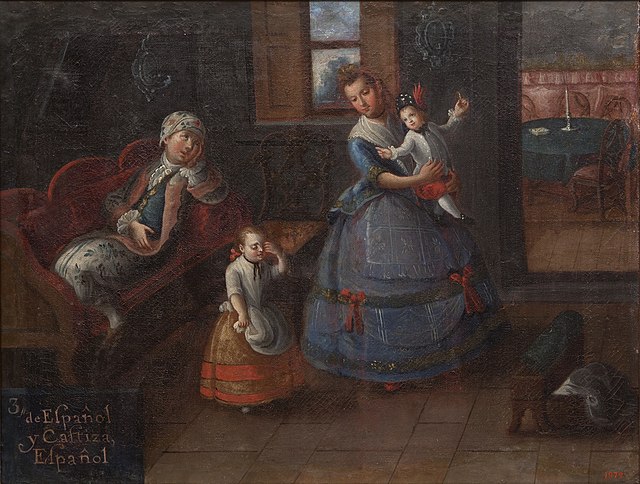Casta is a term meaning lineage or race in Spanish and Portuguese. The term has historically been used as a racial and social identifier for mixed-race offspring in the colonial Spanish Empire in the Americas. The Spanish crown created a basic legal division between Hispanic society and Indigenous peoples, mainly living in indigenous communities. In the Hispanic sector were Spaniards, Black Africans, and mixed-race castas.
Las castas. Casta painting showing 16 racial groupings. Anonymous, 18th century, oil on canvas, 148×104 cm, Museo Nacional del Virreinato, Tepotzotlán, Mexico
Spanish (español) father, Mestiza (mixed Spanish-Indian) mother, and their Castiza daughter. Miguel Cabrera
From Spaniard and Castiza, Spaniard, anonymous (1799), Biblioteca Museu Víctor Balaguer
José Joaquín Magón, IV. Spaniard + Negra = Mulata. "The pride and sharp wits of the Mulata are instilled in her white father and black mother"
Spanish America refers to the Spanish territories in the Americas during the Spanish colonization of the Americas. The term "Spanish America" was specifically used during the territories' imperial era between 15th and 19th centuries. To the end of its imperial rule, Spain called its overseas possessions in the Americas and the Philippines "The Indies", an enduring remnant of Columbus's notion that he had reached Asia by sailing west. When these territories reach a high level of importance, the crown established the Council of the Indies in 1524, following the conquest of the Aztec Empire, asserting permanent royal control over its possessions. Regions with dense indigenous populations and sources of mineral wealth attracting Spanish settlers became colonial centers, while those without such resources were peripheral to crown interest. Once regions incorporated into the empire and their importance assessed, overseas possessions came under stronger or weaker crown control.

Inca emperor Atahualpa is shown surrounded on his palanquin at the Battle of Cajamarca.
Cristóbal de Olid leads Spanish soldiers with Tlaxcalan allies in the conquests of Jalisco, 1522. From Lienzo de Tlaxcala.
Fray Bartolomé de las Casas, Protector of the Indians
Colegio de San Gregorio, Valladolid, where the Laws of the Indies were promulgated








